James McAvoy wasn't meant to be an actor - anything but. His father, who walked out when he was seven, was a roofer, his mother a psychiatric nurse. His grandfather and grandmother, with whom Liz McAvoy moved in with her two children after her husband left, were a butcher and occasional lorry driver respectively. They all lived together in Drumchapel, one of the ugliest housing projects in Glasgow, Scotland. It is tempting to view them as an early version of the chaotic but loving Gallagher family in Shameless, the UK TV's Channel 4 series that provided McAvoy's big break - though without the stealing, incontinence and spectacular falling-down drunkenness.
McAvoy's vague ambitions, at that stage, included joining the navy and becoming a priest: both, in different ways, offered a chance of escape. But mostly, "I wanted to be all right. I remember my friend Mark Doyle and I, this confidence we had that we were going to be all right. And even if we ended up doing something rubbish that we would be happy."
It is fair to say he has done all right. McAvoy's latest film, Atonement, opened the Venice film festival last week to the kind of reviews that actors spend entire careers barely daring to aspire to. His performance as Robbie Turner, the son of a housekeeper at a country estate, raised with ambitions but appallingly wronged, holds the movie together. Inevitably - it is a sweeping period tragedy, after all - both the film and its leads (Keira Knightley is the other) have sparked talk of Oscars. Marco Mueller, the director of the Venice festival, told a newspaper last week that he believed 28-year-old McAvoy was one of the finest acting talents in world cinema today.
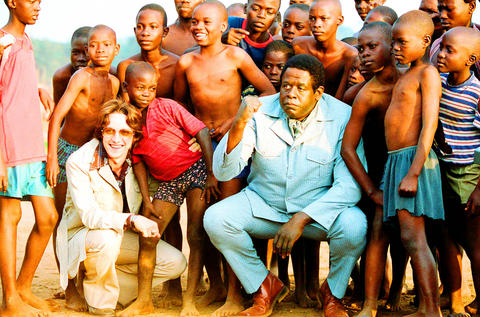
PHOTO: AGENCIES
"Who's that?" says McAvoy when I mention Mueller's comment. "Oh, that's nice of him. Very nice." He's been flipping a silver teaspoon between his fingers and suddenly drops it on the floor; he scoops it up and starts flipping it again. "I don't know. I don't mix with those sorts of people. I don't mix with film industry people. So I really am separate from it, and I try not to talk about it. Ehm ... I generally just try to keep it out of my head. But it's really nice that he's saying that. It's so much nicer than if he was saying I was a hugely overrated wee pikey."
McAvoy's accent has "chilled out" a lot in the past eight years or so, he says, when "English people couldn't understand me sometimes and Americans just couldnae get it," but he retains a guttural Glaswegian brogue, to the frequent shock of those who have only seen him playing impeccably English posh characters.
It's a surprise, too, that in the flesh, McAvoy is really pretty unremarkable. Average height, slight build, jeans, shirt, dark hair. Plain, stubbled face; small neat hands. He has extraordinary blue eyes - huge and clear - but you have to look for them, and he gives the pointed impression that he flicks on the full beam only when he wants to. On screen, however, he has the ability to turn his lean frame into something commanding, radiating physicality and presence. You can't quite take your eyes off him.
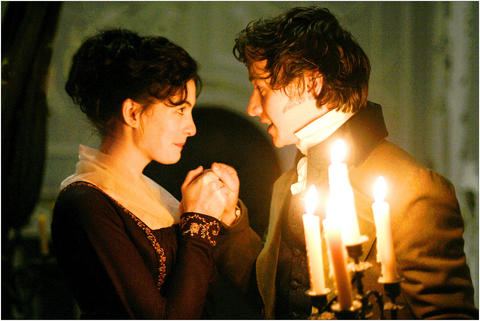
PHOTO: AGENCIES
For instance, the most astonishing scene in Atonement - designedly so - is a long, sweeping single shot of the beach at Dunkirk, where thousands of shattered troops await their evacuation amid scenes of carnage: burning buildings, horses being executed, a battered Ferris wheel rotating forlornly in the distance. McAvoy's character Robbie, and two colleagues, having been separated from their unit, have limped across northern France attempting to rejoin their comrades, and stumble along the beach in profound shock at what they are witnessing. McAvoy is dwarfed by the scale of the scene, the towering buildings and huge, beached boats, and is a head shorter than his two fellow actors, yet he is absolutely dominant, his stature boosted somehow by the pained slump of his shoulders.
McAvoy is fantastically proud of the film, and he is right to be. It is directed by Joe Wright - only his second feature film after last year's Pride and Prejudice, also starring Knightley - and is based on Ian McEwan's Booker-shortlisted novel, a tale of how a misapprehension, and a terrible lie, can in its own way be as destructive as war itself. Cecilia (Knightley) is the daughter of the great house, Robbie has been raised like a son despite his humble origins; having acknowledged their mutual passion, the pair are separated by a malicious accusation by her younger sister. He is taken to prison, and later to war, and it is his journey, from youthful hope to shattered experience, that makes up the emotional heart of the film.
Wright has said that one of the reasons why he particularly wanted the actor for the part was because of McAvoy's own working-class roots. "I think that my journey in life was interesting to him," says McAvoy, a little uncomfortably. "I'm from a working-class environment and I suppose I have changed class. I am no longer working class. And I also have access to a type of class of people that might be construed as the modern aristocracy - do you know what I mean? - all this celebrity bullshit. I think that he felt that was maybe somehow comparable and I might have some point of reference with Robbie.
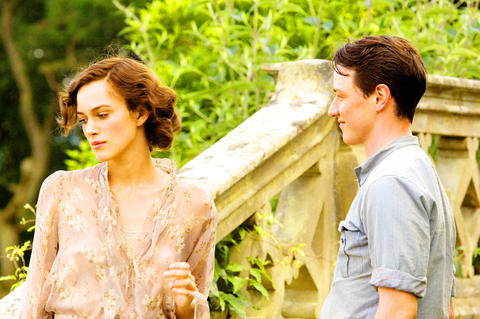
PHOTO: AGENCIES
"Because he is someone who is living in a no-man's land. He is told his whole life is a lie, that class is not a factor for him, that you can transcend class if you want to and if you work hard enough, if you just get a wee break. And one day someone comes along and tells him that that's a lie, that he isn't who he thinks he is, and you're going to jail. I think I'm always slightly worried that something like that is going to happen. I'm always slightly worried that somebody is going to find me out and come along [saying], 'Ach, you're not actually as good as you thought you were. You are just a wee boy fae' the Drum.'"
Fall
continued from p14
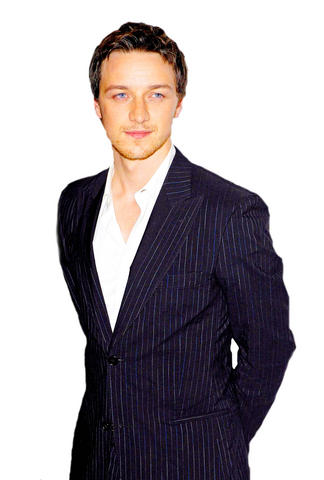
PHOTO: AGENCIES
The trappings of his success - today we are in a suite at Claridge's in London, ahead of the film's London premiere - McAvoy describes as "pockets of fucking madness," and he insists that his own life is "mundane, and I love it that way." But if he is self-conscious about celebrity, he is not about his remarkable career success. "Don't get me wrong," he says, "[my career] has been much quicker than some other people's, but it's been - what? - 10 years now of just getting jobs that are slightly better, slightly better, slightly better."
His career had a pretty implausible beginning, all the same. McAvoy's big break came, in an oft-told tale, when the Scottish actor David Hayman came to address the 16-year-old's school, but was heckled by his classmates for being a bit "poofy." McAvoy went to apologize on behalf of his peers, and on a whim offered to come and make tea on Hayman's next film set. "I was just trying to be a nice guy, but I also found it quite interesting. He had worked with Arnold Schwarzenegger … !" Four months later Hayman rang and asked him to audition for a part. ("I didn't ask to become an actor or anything like that. I just asked if I could come and make his tea.")
That role, as the son of a pimp in The Near Room, led to a stint at the Royal Scottish Academy of Music and Drama, then from small TV parts in the Bill and the HBO series Band of Brothers to the comedy Early Doors and Paul Abbott's award-winning State of Play. Abbott was so impressed he cast him for his equally garlanded Manchester comedy-drama-romp Shameless in 2004. McAvoy stayed less than two series, moving on to play such varied parts as a Dublin quadriplegic in Inside I'm Dancing, the faun Mr. Tumnus in The Lion, the Witch and the Wardrobe, and the young Scottish doctor who falls under Idi Amin's spell in last year's adaptation of The Last King of Scotland, a terrific performance that was perhaps unjustly overshadowed by Forest Whitaker's Oscar-winning turn as the dictator.
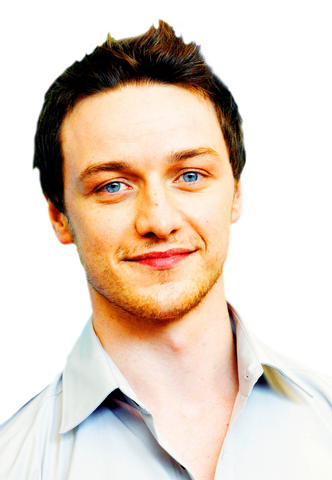
PHOTO: AGENCIES
His steep career path has also had the happy consequence of introducing him to his wife, Anne-Marie Duff, eight years his senior; she played his girlfriend in Shameless and has gone on to an impressive film and theater career herself. The couple married in private last year and have a pact, she has said, never to discuss each other. And though McAvoy can't quite resist the occasional delighted reference in interviews to "the wife," they never do. (Also emphatically never discussed is McAvoy's missing father - also called James - despite the older man's periodic emergence in the tabloid papers pleading for a reconciliation. The pair have not spoken in more than two decades.)
"I'm very defensive and very protective of [my relationship] because you only get one life," says McAvoy, "and when you meet people you care about you want to give them a part of yourself, because you want to let them into your life, and if you're giving it to everybody then what is your soul? It's very cheap."
Atonement will inevitably increase the curiosity, however; it's what the actor calls his "first conventional leading man" role. The movie is not perfect; many considered McEwan's novel, with its complex, contrived plotting and six-decade narrative, to be unfilmable. Its meaning suddenly clicked into place, McAvoy has said, when he realized that the role of Robbie was almost symbolic rather than strictly literal.
"He's wholly good," he says. "He is nearly Christ-like, or angelic, and I think that is why it is so hard for an audience, but also definitely for me, to watch him be torn apart. He is us, being ripped apart. He is humanity. He is my favorite character that I have ever played. I love him dearly. I wish I was him. I wish he existed."
After so much high emotion, his latest project, an adaptation of a comic book tale called Wanted, in which he plays a superhero assassin, must have come as a relief. "It's daft. It's fucking mad. And the director [Russian Timur Bekmambetov] is nuts, like his head is in a different universe really. It's going to be a very weird and interesting big action-y flick."
McAvoy is the lead, and Angelina Jolie and Morgan Freeman co-star, which for the lad from Drumchapel must be pretty nuts in itself. (He shares "one epic snog" with Jolie - "which is kind of weird.") Does he feel on the edge of a breakthrough into crazed uber-celebrity? "I feel on the edge of failure quite a lot." But he must be daunted at his move into the absolute A-list. Keira Knightley is one thing, but Jolie ... ?
"Yeah. I don't know. I hope I'm right in this, but unless you're an idealized human being, the Brad Pitts and the Angelinas and the Keiras and stuff ... . See, if I won 20 Oscars next year, right? I still think that given the choice of running after me down the street and running after Keira, they would run after Keira. And that's fine with me, by the way. I'm more than happy with that."

June 9 to June 15 A photo of two men riding trendy high-wheel Penny-Farthing bicycles past a Qing Dynasty gate aptly captures the essence of Taipei in 1897 — a newly colonized city on the cusp of great change. The Japanese began making significant modifications to the cityscape in 1899, tearing down Qing-era structures, widening boulevards and installing Western-style infrastructure and buildings. The photographer, Minosuke Imamura, only spent a year in Taiwan as a cartographer for the governor-general’s office, but he left behind a treasure trove of 130 images showing life at the onset of Japanese rule, spanning July 1897 to

In an interview posted online by United Daily News (UDN) on May 26, current Chinese Nationalist Party (KMT) Chairman Eric Chu (朱立倫) was asked about Taichung Mayor Lu Shiow-yen (盧秀燕) replacing him as party chair. Though not yet officially running, by the customs of Taiwan politics, Lu has been signalling she is both running for party chair and to be the party’s 2028 presidential candidate. She told an international media outlet that she was considering a run. She also gave a speech in Keelung on national priorities and foreign affairs. For details, see the May 23 edition of this column,

One of the most important gripes that Taiwanese have about the Democratic Progressive Party (DPP) is that it has failed to deliver concretely on higher wages, housing prices and other bread-and-butter issues. The parallel complaint is that the DPP cares only about glamor issues, such as removing markers of Chinese Nationalist Party (KMT) colonialism by renaming them, or what the KMT codes as “de-Sinification.” Once again, as a critical election looms, the DPP is presenting evidence for that charge. The KMT was quick to jump on the recent proposal of the Ministry of the Interior (MOI) to rename roads that symbolize

Jade Mountain (玉山) — Taiwan’s highest peak — is the ultimate goal for those attempting a through-hike of the Mountains to Sea National Greenway (山海圳國家綠道), and that’s precisely where we’re headed in this final installment of a quartet of articles covering the Greenway. Picking up the trail at the Tsou tribal villages of Dabang and Tefuye, it’s worth stocking up on provisions before setting off, since — aside from the scant offerings available on the mountain’s Dongpu Lodge (東埔山莊) and Paiyun Lodge’s (排雲山莊) meal service — there’s nowhere to get food from here on out. TEFUYE HISTORIC TRAIL The journey recommences with